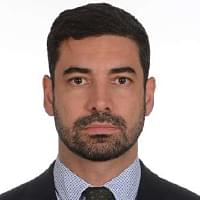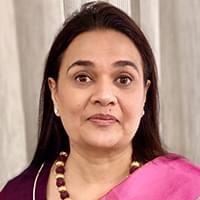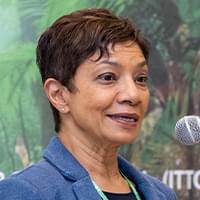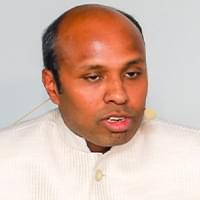- 29 July 2025
- JST 10:50 - 11:50 (GMT+09:00)
- 503 + Online
- Simultaneous interpretation
Accelerating Climate Action through a Synergistic Approach: Delivering on Net-Zero and Sustainable Development at COP30
Before viewing
This footage is a direct recording of the meeting proceedings, and therefore it contains parts in both Japanese and English.
Please use the YouTube subtitles (CC) function as needed.
- Click the settings icon at the bottom right of the video screen.
- Select “subtitles” → “English (auto-generated)”.
- Under “English (auto-generated)”, select “auto-translate” and choose your preferred language.
Note: For example, if you select Japanese, subtitles will not be displayed for Japanese speech, and only the English portions will be shown with Japanese auto-translation.
We appreciate your understanding and cooperation.
Summary
The moderator opened the session by introducing the full-scale implementation of Article 6 of the Paris Agreement. It was emphasised that these mechanisms are not only instruments for reducing greenhouse gas emissions but also drivers of broader social, environmental and economic co-benefits. In particular, integrating climate action with biodiversity conservation, circular economy and social equity was highlighted as a central theme at COP30 in Brazil. Each panelist was asked: "What is the vision of the synergy approach?" and "How do we move forward and take action?" These questions guided a discussion focused on practical steps to translate commitments into real-world outcomes.
The first speaker explained that COP30 will be the first to fully utilise the Global Stocktake (GST), a mechanism critical for assessing progress and guiding future mitigation efforts. GST provides an opportunity to align climate actions with SDGs, particularly poverty reduction, decent work, and social inclusion. The second speaker reflected on the historical evolution from the 1992 Rio Summit through the Millennium Development Goals to the SDGs, highlighting the importance of learning from past frameworks. The speaker also introduced the Brazilian concept of “Mutirão,” representing voluntary collective action by local communities, illustrating the value of inclusive collaboration and grassroots engagement.
The third speaker discussed nature-based solutions (NbS) and the role of sustainable tropical timber frameworks, emphasising their contributions to forest conservation, carbon sequestration, and food and water security. These approaches demonstrate how forest management can support both climate and local livelihoods. The fourth speaker highlighted economic risks to agriculture under a 1.5°C warming scenario, noting potential reductions in rice and dairy production. The speaker stressed the need for climate technologies that are economically viable, scalable, and capable of generating co-benefits across multiple sectors.
In the subsequent discussion, the first speaker highlighted that NbS can address both mitigation and adaptation while generating employment and supporting healthier communities, and should be integrated into national strategies. The second speaker introduced the Tropical Forest Forever Facility (TFFF), a Brazilian investment fund that provides financial incentives for forest preservation and encourages international collaboration. The third speaker pointed out the lack of investment in Africa and called for systematic integration of existing initiatives, knowledge and resources into a coordinated framework. The fourth speaker expressed concern that forests are often overlooked and stressed the importance of replicating successful models led by ITTO.
In closing, the moderator underscored COP30’s significance, marking ten years since the adoption of the SDGs and the first COP in Brazil since 1992. It was emphasised that translating commitments into concrete actions requires coordinated efforts across policy, technology, finance and stakeholders, with inclusive engagement of youth and countries at all development stages. The session concluded with the shared recognition that a synergy-driven approach, leveraging innovative tools and partnerships, is essential to achieve net-zero and sustainable development goals simultaneously.
Summary written by: Diana KHAN (A6IP, IGES) | TSUJITA So and HORIOKA Akari, Climate Youth Japan (CYJ)
Panel Discussion
KOAKUTSU Kazuhisa, Director of the Paris Agreement Article 6 Implementation Partnership Center, IGES

KOAKUTSU Kazuhisa
Director of the Paris Agreement Article 6 Implementation Partnership Center, IGES
Head of Energy, Environment and Agriculture, Embassy of the Federative Republic of Brazil

Henrique ELLER
Head of Energy, Environment and Agriculture, Embassy of the Federative Republic of Brazil
Henrique Eller was born on December 24, 1985, in Florianópolis, Brazil. He holds a degree in Mechanical Engineering from the Federal University of Santa Catarina and a Master’s degree in Business Administration from Paris 1 Panthéon-Sorbonne University.
In the private sector, he worked for companies in France’s automotive and nuclear industries, as well as for Brazil’s leading steel producer.
He entered the Brazilian diplomatic service in 2013 through a public entrance examination. At the Ministry of Foreign Affairs, he served in the Office of Congressional Relations and the Foreign Minister’s Cabinet. He also held a position at the Presidency of the Republic of Brazil.
He served for three years as Head of the Economic Section at the Embassy of Brazil in Germany. Since August 2023, he has been Head of the Energy, Environment, and Agriculture Section at the Embassy of Brazil in Japan.

Purvi MEHTA
Senior Global Climate Specialist
Executive Director, International Tropical Timber Organization (ITTO)

Sheam SATKURU
Executive Director, International Tropical Timber Organization (ITTO)
Ms Satkuru was appointed as ITTO’s first female Executive Director at the 57th session of the International Tropical Timber Council in December 2021. She holds a Master in Corporate and Commercial Law from King’s College, the University of London, and was called to the English Bar in 1993.
Ms Satkuru has nearly 30 years of experience in tropical forest policy and the wood products industry. She is a skilled specialist in international trade regulations, with strong skills and experience in international negotiations and collaboration, advocacy, legal and policy analysis, communications and public affairs. She has served as a technical expert, adviser and board member in several capacities over the years.
Throughout her career, she has focused very much on international policies focused on sustainable tropical forestry, legal and sustainable international trade, and best practices in forest products/industries, including legality verification and forest certification, amongst other matters.
Manager, Markets and Non-Markets Support and Stakeholder Interaction Sub-Division, Mitigation Division, UNFCCC

Perumal ARUMUGAMPILLAI KALYANI
Manager, Markets and Non-Markets Support and Stakeholder Interaction Sub-Division, Mitigation Division, UNFCCC
At UNFCCC, manages the implementation of the Markets and non-markets related work under the Paris agreement, and under the Kyoto Protocol. In his role cover the intergovernmental negotiations process on all international co-operative and market related instruments under the convention, Kyoto Protocol and the Paris agreement (Article 6). He provides strategic, managerial, and technical guidance for the development of regulations in Paris Agreement crediting mechanism (PACM), Review of the cooperative approaches under Article 6 and its relevant reporting, stakeholder interaction and capacity building efforts.
He is a representative nominated from UNFCCC to participate in G20 process related to climate, development and sustainable finance working groups. In addition, he also serve as member of working groups related to CORISA implementation aspects in the International civil aviation organization (ICAO) process covering issues like alternative fuels for aviation and carbon offsets. Prior joining the UNFCCC, consecutively for four years elected from the Asia pacific region as expert member to support four technical bodies under the CDM – Executive Board in areas of development of quantification methodologies to measure GHG impacts by mitigation activities, assessment of GHG mitigation (CDM) projects and performance evaluation of independent auditors (DOE) under the CDM. Have experience in implementation of energy efficiency measures in more than 50 industrial facilities. The only member ever to participate in all the four technical bodies. Also, have served as country expert to the Asian development bank on oil and gas sector mitigation projects.
He is a chemical engineer by graduation and a postgraduate in energy management and certified Energy Auditor, with more than twenty years of experience in conceptualizing, developing and implementing climate mitigation projects across globe covering varied sectors and technical areas using international financing schemes & mechanisms.
-min.JPG)
-min.JPG)
-min.JPG)
-min.JPG)
-min.JPG)
-min.JPG)
-min.JPG)
-min.JPG)
-min.JPG)
-min.JPG)
-min.JPG)
-min.JPG)
